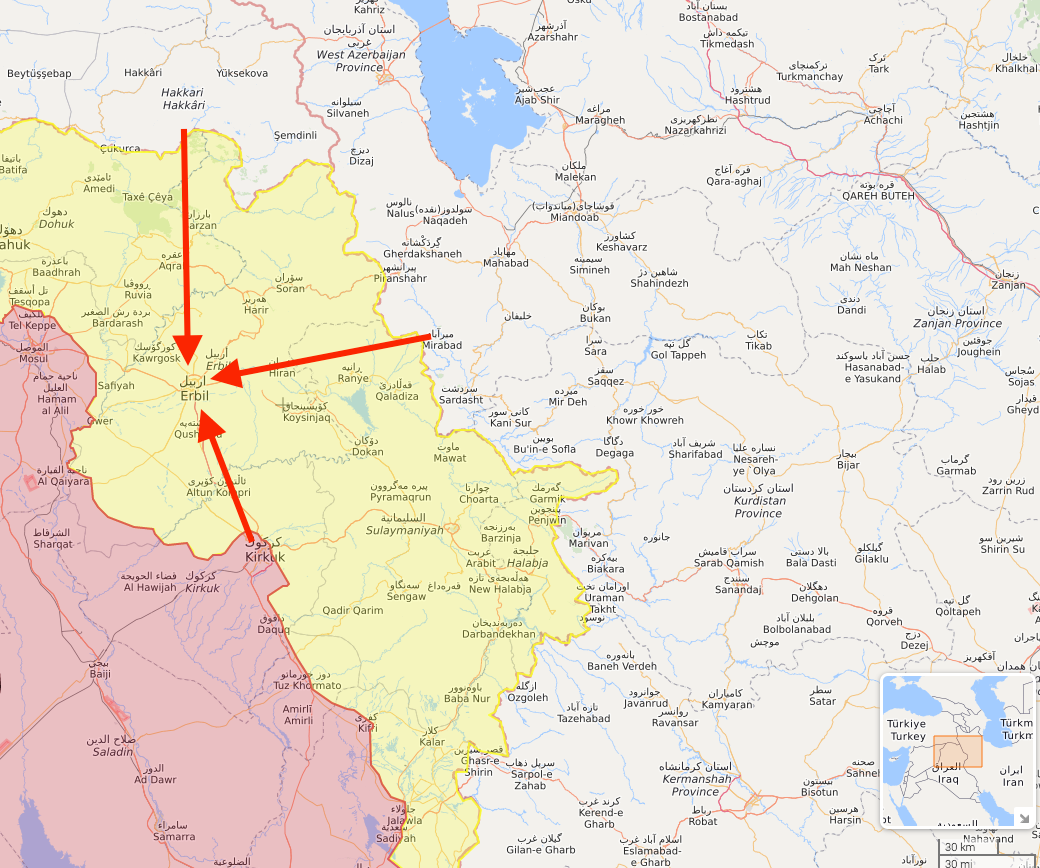Kurdish Peshmerga forces appear to have ceded the city of Kirkuk to the Iraqi military.
That difficult but courageous decision has temporarily delayed a bloody Iraqi civil war.
That said, Iraq’s security situation remains immensely fragile. If Iraqi forces now push north along Highway 2 towards the Kurdish capital, Erbil, the Peshmerga will fight hard and open conflict will likely follow. Be under no illusions, that conflict will quickly destabilize the region.
The seeds of a regional conflagration are already obvious.
First off, Iranian-led Shia militias are playing a major role in the offensive. Operating under their faux-Iraqi nationalist Popular Mobilization Forces, or PMF, banner, these militias are notorious for their sectarian warfare and disregard for human rights. While their assertions are hard to verify, Kurdish news sources are already claiming that civilians have been targeted by the PMF.
The key point here is that the PMF are puppets of the Islamic Revolutionary Guard Corps. As such, their aggressive involvement speaks to Iranian strategic interests in defeating any separatist movement that might spill into Kurdish-dominated areas of western Iran and weakening a major American ally in Iraq. As the LiveMap illustrates below, Iran’s long border with Iraqi Kurdistan affords significant means to rapidly move men and materiel against the Kurds.

Moreover, the mapped red lines show possible offensive lines of approach for Iraqi, Iranian, and Turkish forces.
Indeed, Turkey’s role is of critical importance here.
Led by President Recep Tayyip Erdogan, Turkey senses an opportunity to smash Kurdish interests in northern Iraq. Turkey is considering closing its southern land border with Iraqi Kurdistan and has suggested it would respond positively to any Iraqi request for military support. Closing that border would mean crippling the Kurdish economy by cutting off its oil exports to the world.
Yet Turkey is not unified on this issue. On Monday, Turkey’s Kurdish-dominated HDP party tweeted, “Trying to seize the will of the people of Iraqi Kurdistan using military methods will ignite a new regional war.” The HDP’s message is an implicit warning to Erdogan that the crisis may ripple into Turkey. While the HDP has only 54 seats in Turkey’s parliament, it retains very significant support in southeastern Turkish provinces bordering Iraqi Kurdistan. If Turkey’s Kurdish community wanted to, they could instigate a major insurgency.
But let’s be clear, none of these escalatory outcomes are in America’s interest. A unified Iraqi, Iranian, and Turkish offensive to cripple Kurdistan wouldn’t just be a moral disaster, it would be a huge blow to American interests in the region. At a basic level, the Kurds have fought alongside U.S. forces for many years now and deserve more than our abandonment. That speaks to the broader issue.
While I believe the Kurds were wrong to call for independence, the U.S. cannot simply sit back and watch them be pummeled. That course would signal a lack of resolve to regional partners and degrade our ability to push them in positive political directions. But it would also invite a similar purge of the Kurds in Syria and facilitate a joint Russian-Iranian orbit of influence all the way to the Mediterranean. As I’ve explained, this effort is already underway as Erdogan kneels to Vladimir Putin’s throne.
So what should be done?
Well, first, the Trump administration should redouble its efforts to get the Kurds and Iraqi government to the table. The defining objective here should be slowing down Kurdish movements towards independence and restraining Iraqi/PMF forces from further offensives into Kurdish-dominated territory. While the former Iraq-Iraqi Kurdistan status quo was tense, it was far better than the current situation. I believe Iraqi Prime Minister Haider al-Abadi’s government would be amenable to a compromise, but is being influenced by Iranian hardline interests. To console Abadi, Trump should be prepared to offer a new aid package to Baghdad.
The second U.S. response is to challenge Iran. If we are not already, the U.S. should give the Peshmerga intelligence on the movement of PMF forces. The benefit of U.S. technical and aviation intelligence platforms would allow the Kurds to anticipate PMF movements and isolate them. Although it entails obvious risk, I also believe the U.S. should station Special Forces in an observational, though not embedded, capacity around Erbil. This deployment would deter PMF attacks or, in the event of an attack, give the U.S. a pretext to launch air strikes on PMF formations.
Third, the U.S. should make clear to Erdogan that we will respond negatively to any Turkish land offensive or restriction of aid supplies into Iraqi Kurdistan. As I noted late last year, the U.S. has untapped diplomatic means with which to influence Erdogan’s assessment of his interests. The humanitarian concerns here cannot be discounted: If Kurdistan is cut off from the outside world, its people will suffer immensely.
Ultimately, while this situation is fraught with risk, U.S. leadership is crucial. Our objective should be the restoration of a messy status quo between Baghdad and Erbil and the marginalization of Iranian and Turkish efforts to escalate this brewing conflict.
